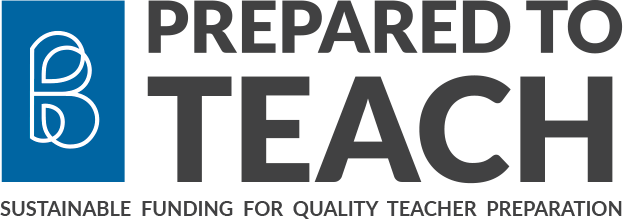Prepared To Teach works across the country to solve a key problem in education: making sure everyone who wants to be a teacher can afford to attend a quality preparation program.
-

Towards a National Definition of Teacher Residencies
Pathways Alliance, Prepared To Teach, and National Center for Teacher Residenices
The Pathways Alliance has developed this definition of teacher residencies to help clarify the field's use of the term. Our intention with this document is to support local partnership discussions about residency design and improvements and to provide state, regional, and federal leaders with a condensed yet thorough definition to guide policies that can support high-quality residencies to attract, prepare, and retain a robust and diverse teaching workforce.
The initial draft was co-constructed by the Teacher Residency Working Group, a collaborative group of Pathways Alliance members with expertise in residency development, support, and research. To inform and revise this definition, the working group sought input from other Pathways Alliance members and over 40 external groups and leaders — including districts, preparation programs, state education departments, and national professional and advocacy groups.
-

Communications Guide Version 1.0
Prepared To Teach
This guide is focused on messaging about teacher residencies. It provides recommendations about branding, visual, narratives, and social media.
-

Website Review Guide
Prepared To Teach
This deck shares examples of strong teacher residency websites.
-

A Path to Equity: Solving New York's Teacher Turnover & Quality Challenges
Prepared To Teach, Bank Street College
This white paper frames both the case for and an approach to addressing persistent teacher quality, diversity, and turnover challenges in the State of New York. A growing set of research and promising practice informs the report, which is intended to offer a high-level understanding of the complexities around how the economics of teacher preparation both drives educational inequities and can be shifted to promote educational quality and equity by investing in funded teacher residencies.
-

A Primer for Incorporating Pre-Service Co-Teaching Into Teacher Residencies
Prepared To Teach, Bank Street College
Pre-Service co-teaching – where teacher candidates engage as co-teachers during student teaching – is a strong instructional model, especially when combined with yearlong teacher residencies. This brief features a combination of resources, ideas, and activities that can help your preparation program/school district partnership create a shared understanding of pre-service co-teaching.
-

Federal Funding for Aspiring Teachers: An Investment in the Nation's Future
Prepared To Teach, Bank Street College
This concept paper is a high-level overview of the case for and a pathway to achieve universal residencies across the nation created to inform policy discussions at the U.S. Department of Education.
-

Registered Apprenticeship Programs and Teacher Residencies: Building Shared Understandings Between Workforce Development and Education
Prepared To Teach, Bank Street College
This brief is the first in a series exploring principles that Prepared To Teach has surfaced as helpful for designing Registered Apprenticeship Programs for teacher residencies to promote and support high-quality teacher preparation systems. Sign up for our monthly newsletter for future releases.
-

Teacher Preparation Programs and Teacher Candidates Supporting Staffing Needs During COVID-19 - Program Highlights
Prepared To Teach, Bank Street College
A compilation of programs from across the Prepared To Teach National Learning Network that have creative staffing models that directly address staffing and substitute teaching shortages.
-

Dollars and Sense: Federal Investments in Our Educator Workforce
Karen DeMoss
Supporting aspiring educators during preparation is essential. The field is ready to embrace shifts that will make teacher preparation more uniformly strong, sustainable, and equitably accessible—investments in preparation will make such shifts possible. This report makes the case for a renewed commitment to excellent teacher preparation, made possible by federal investments.
-

Simple Shifts: Paying Aspiring Teachers with Existing Resources
Hannah Dennis and Karen DeMoss
Reallocation helps partnerships redesign work roles to better support preparation efforts and to allow candidates to earn compensation during their clinical practice. Simple Shifts shares ways in which residents can bring value to the classroom and how districts and programs have leveraged the skills of aspiring teachers.
-

The Residency Revolution: Funding High-Quality Teacher Preparation
Hannah Dennis and Karen DeMoss
(Re)Investment helps districts find ways to make shifts that can permanently embed residency funding into local budgets. The Residency Revolution is about identifying and maximizing the savings that a high-quality residency program can bring to a district.
-

The Affordability Imperative: Creating Equitable Access to Quality Teacher Preparation
Hannah Dennis, Karen DeMoss, and Divya Mansukhani
This report is one of three case studies on the "3Rs of sustainably funded teacher preparation" (reallocation, reduction, and reinvestment) developed by Prepared To Teach. This case focuses on reduction—the strategies and stories inside are intended to help universities maximize access to financial aid sources and minimize costs associated with quality programs.
-

Program Cost Tool
Amie Kaufenberg and Prepared To Teach, Bank Street College
For a comprehensive look at a preparation program budget, this Excel-based tool will estimate five years of costs and potential savings to assist in your immediate and long-term planning. Administrators or program leaders might find this especially helpful for considering shifts in teacher preparation programming. See the introduction document for guidance on how to use.
-

#MoreLearningLessDebt: Voices of Aspiring Teachers on Why Money Matters
Divya Mansukhani and Francheska Santos
This report delves into a 2019-2020 survey that Prepared To Teach conducted at twelve institutions across seven states and explores aspiring teachers’ financial burdens with a specific focus on the link between said burdens and the desire for strong teacher preparation programs that include clinical practice. Learn about the many daily anxieties that aspiring teachers face, the difficult choices they are often forced to make in order to pursue their passion for teaching, and the impact this has on the quality and diversity of teacher candidates. Finally, find out why the future of the teaching profession depends on improving access to quality preparation programs by ensuring that aspiring teachers are supported financially in their journey to becoming the best-prepared educators they can be.
-

Aspiring for More: Deeper Partnerships for Sustainable Residencies
Zachary Paull, Karen DeMoss, and Divya Mansukhani
Aspiring for More: Deeper Partnerships for Sustainable Residencies shares lessons learned from 12 university/school district sites as they implemented teacher residency programs during the 2019-2020 school year. Sites began their programs in 2019, after a year of development and co-construction activities led by Prepared To Teach, and contributed to a national learning network. The report focuses on findings from this work in six domains: sustainability, partnership development, program redesign, supporting school improvement, mentor development, and resident learning. Learn more about the residency implementation process in different contexts and the key takeaways for universities and districts looking to establish a sustainable residency program.
-

A Path to Equity: Solving New Mexico's Teacher Turnover Challenges
Prepared To Teach, Bank Street College
This memo discusses New Mexico's need for shifts in teacher preparation structures and options to meet Yazzie/Martinez requirements. New models of sustainable, affordable teacher residencies that can provide New Mexico the teaching workforce its students need are outlined.
-

ARP Webinar Slide Deck
Prepared To Teach, Bank Street College
Slide deck for Prepared To Teach webinar on May 17th, 2021.
-

District ARP ERRA Funds
Prepared To Teach, Bank Street College
This document contains ideas for districts to leverage ARPA funds.
-

ESSER Logic Model for Teacher Residencies
Prepared To Teach, Bank Street College
This document provides support for Local Education Agencies (LEAs) who might wish to use their Elementary and Secondary Emergency Relief (ESSER) Funds to develop teacher residency programs. Residencies are explicitly allowable under federal guidance, as they can address both immediate COVID-19 learning opportunity gaps and help districts "build back better" by diversifying the teaching force, reducing turnover, and improving outcomes. The logic model above is part of the new resource that LEAs can use to complete their required ESSER plans.
-

Expert Report
Prepared To Teach, Bank Street College
Please do not cite without permission. Contact Karen DeMoss (kdemoss@bankstreet.edu) for information.
This report offers a comprehensive review of literature on teacher quality as it relates to preparation, culminating with an analysis of New York State certifications and a policy solution to improve teacher quality and retention in New York City schools
-

Exploring District Investments in Residencies
Prepared To Teach, Bank Street College
This one-page document illustrates ways school districts can adjust existing funding streams to support teacher candidates during their residency year. Examples of include substitute teaching days for residents, professional development opportunities, and co-teaching alongside mentor teachers.
-

Forming and Sustaining an Advisory Group
Prepared To Teach, Bank Street College
This slide deck outlines the basics of forming an effective advisory group to develop a strong residency partnership. By developing trust and collaborating on shared, mutually beneficial work, advisory groups can support both short-term and long-term partnership goals. The presentation includes supplementary notes on many slides.
-

Guidance: Resident Expectations and Agreements
Prepared To Teach, Bank Street College
This document outlines expectations that residency programs might want to make explicit for those who will be enrolling in the residency. Many of these considerations also would be included in formal agreements between individual residents and preparation partnerships, for example when residents must agree to serve as teachers in a district in exchange for receiving funding during the program.
-

Integrating Residencies into Substitute Teaching
Prepared To Teach, Bank Street College
This one-page document illustrates the possibilities and benefits of having residents take on substitute teaching roles in a district. Dollars previously allocated to substitute teaching can be redirected toward candidate stipends while substitute teaching needs are largely met by the cohort of residents.
-

Preparation Program and District Partnership Agreement Considerations
Prepared To Teach, Bank Street College
This document outlines key considerations to keep in mind when building a residency partnership. Articulating agreements can help clarify the responsibilities of each party—programs and schools or districts—as well as foster a shared understandings of the mutual goals and responsibilities the partnership wishes to embrace. Agreements can remain informal or can form the basis for a formal Memorandum of Understanding (MOU).


